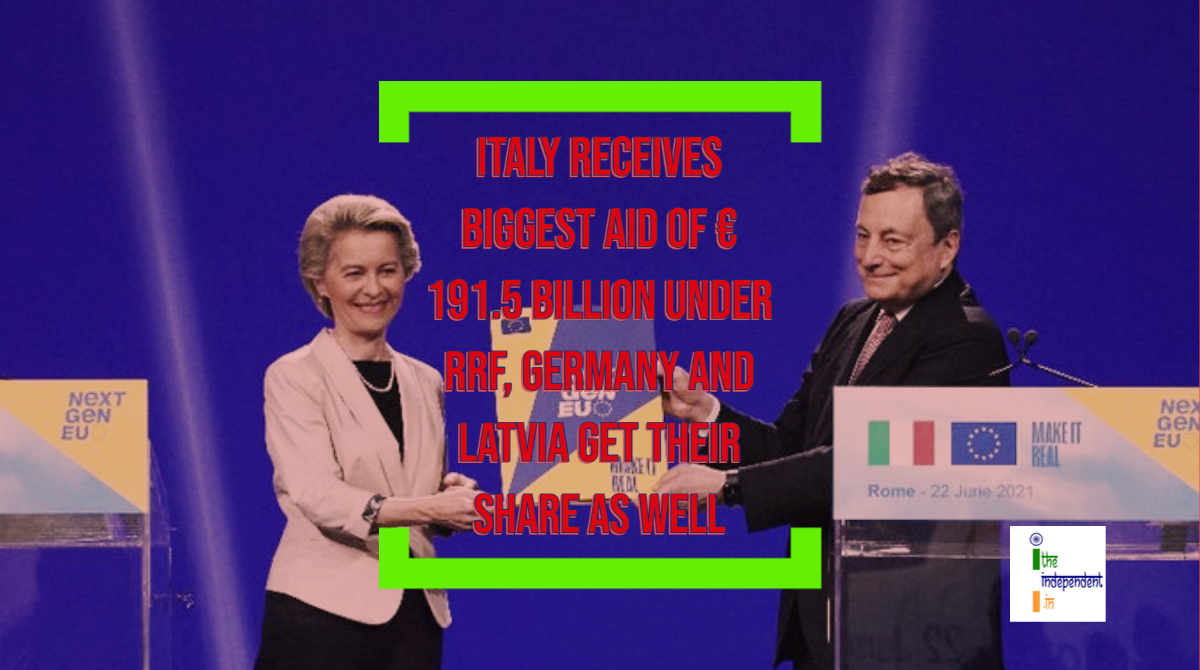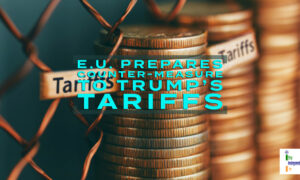
European Commission approves biggest aid of € 191.5 billion to Italy under RRF, sanctions € 25.6 billion to Germany and € 1.8 billion to Latvia
The European Commission today, i.e., Tuesday, June 22, 2021, approved the biggest aid of € 191.5 billion to Italy under the Recovery and Resilience Facility (RRF). It also sanctioned the Recovery and Resilience Plan of Germany and Latvia, approving funds in tune of € 25.6 billion and € 1.8 billion respectively.
Italy will receive € 68.9 billion in grants and € 122.6 billion in loans. Italy will allot 37% of the total funds to tackle climate issues including financing of large-scale renovation programme to increase energy efficiency of buildings. It will also promote green energy in residential buildings. The plan also includes measures like reducing greenhouse gas emissions from transport, investments in sustainable urban mobility and railway infrastructure. Investment for switching to green energy will include € 12.1 billion and cost of moving to sustainable mobility will be € 32.1 billion.
Italy’s will also dedicate 25% of the funds or €13.4 to digital transition. This covers digitalisation of businesses, expansion of ultra-fast broadband networks and 5G connectivity. It will also make investments for digitalisation of general public administration, health, justice and education.
Taking it to twitter, the President of European Commission – Ursula von der Leyen tweeted,
Green light to Italy's €191.5 billion recovery plan!#NextGeneration is the largest recovery package in
— Ursula von der Leyen (@vonderleyen) June 22, 2021history.
will receive the largest share.
We are putting our Union’s strength at the service of Italy’s recovery.
The plan includes measures to contribute to the sustainability of public finances, increase the resilience of the healthcare sector, improve the effectiveness of active labour market policies, and improve education outcomes. The plan will also boost investment to reduce regional disparities, increase the effectiveness of the business.
The plan also provides sufficient details on how national authorities will prevent, detect and correct instances of conflict of interest, corruption and fraud relating to the use of funds. The European Council would disburse € 24.9 billion to Germany in pre-financing. This represents 13% of the total amount allocated to Germany.
The other plan which got approved today was of Germany which includes an extensive set of mutually reinforcing reforms and investments address all or most of the economic and social challenges outlined in the country-specific recommendations (CSRs) addressed to Germany by the European Council.
As per Germany’s Recovery and Resilient Plan, it will devote 42% of funds to measures that support climate objectives like decarbonising industry with focus on renewable hydrogen, investments in sustainable mobility and the renovation of residential buildings to improve energy efficiency.
Germany will use € 2.5 billion to support the energy efficiency renovation of buildings and another € 2.5 billion for acquisition of electric cars. Germany will dedicate another 52% to measures that support digital transition such as digitisation of public services, businesses and education.
Ursula tweeted,
Green light to Germany's recovery plan under #NextGenerationEU
— Ursula von der Leyen (@vonderleyen) June 22, 2021
It will supportto emerge from the pandemic stronger.
The reforms and investments will help digitalise and decarbonise the economy to make it ready for the future.
The plan will also help overcome challenges in investment and reduce administrative burdens. It will also support students with disadvantages, enhance provision of childcare, improve transparency of pensions and curb increases in the tax wedge. The European Council would disburse € 2.3 billion to Germany in pre-financing. This represents 8.7% of the total amount allocated to Germany.
Another Recovery and Resilience Plan which European Commission approved today is of Latvia, allowing them € 1.8 billion.
Latvia will dedicate 38% of the funds to climate issues with focus on sustainable mobility with investments to help overhaul transport networks in the Riga Metropolitan Region. Upgradation of electricity grid and transforming residential buildings to green energy are also on the lists.
Approving the plan, Ursula tweeted,
Happy to endorse Latvia’s recovery plan under #NextGenerationEU
— Ursula von der Leyen (@vonderleyen) June 22, 2021
Securing Latvia’s green and digital transition requires investment and reform.
Theplan has a great potential to transform Latvia and help build a green and digital future for its citizens.
It will allocate further 21% to digital. This will include investments in basic and advanced digital skills and in the digitalisation of public administration. It will help businesses promote research and development. Latvia will use € 95 million for digital upskilling to improve digital skills.
The plan addresses challenges identified in the areas of healthcare, education and skills, social inclusion, research and innovation, affordable housing, public administration and business climate. The European Council would disburse € 236 million to Latvia in pre-financing. This represents 13% of the total amount allocated to Latvia.
The E.U. had announced a € 672.5 billion RRF in 2020 to help European economies cope-up with the fight the economic crisis caused by Coronavirus (COVID-19). Of this, € 312.5 billion will be given as grants and € 360 billion in loans. All the 27 Member States are required to submit a recovery and resilience plan to get their share of funds.







